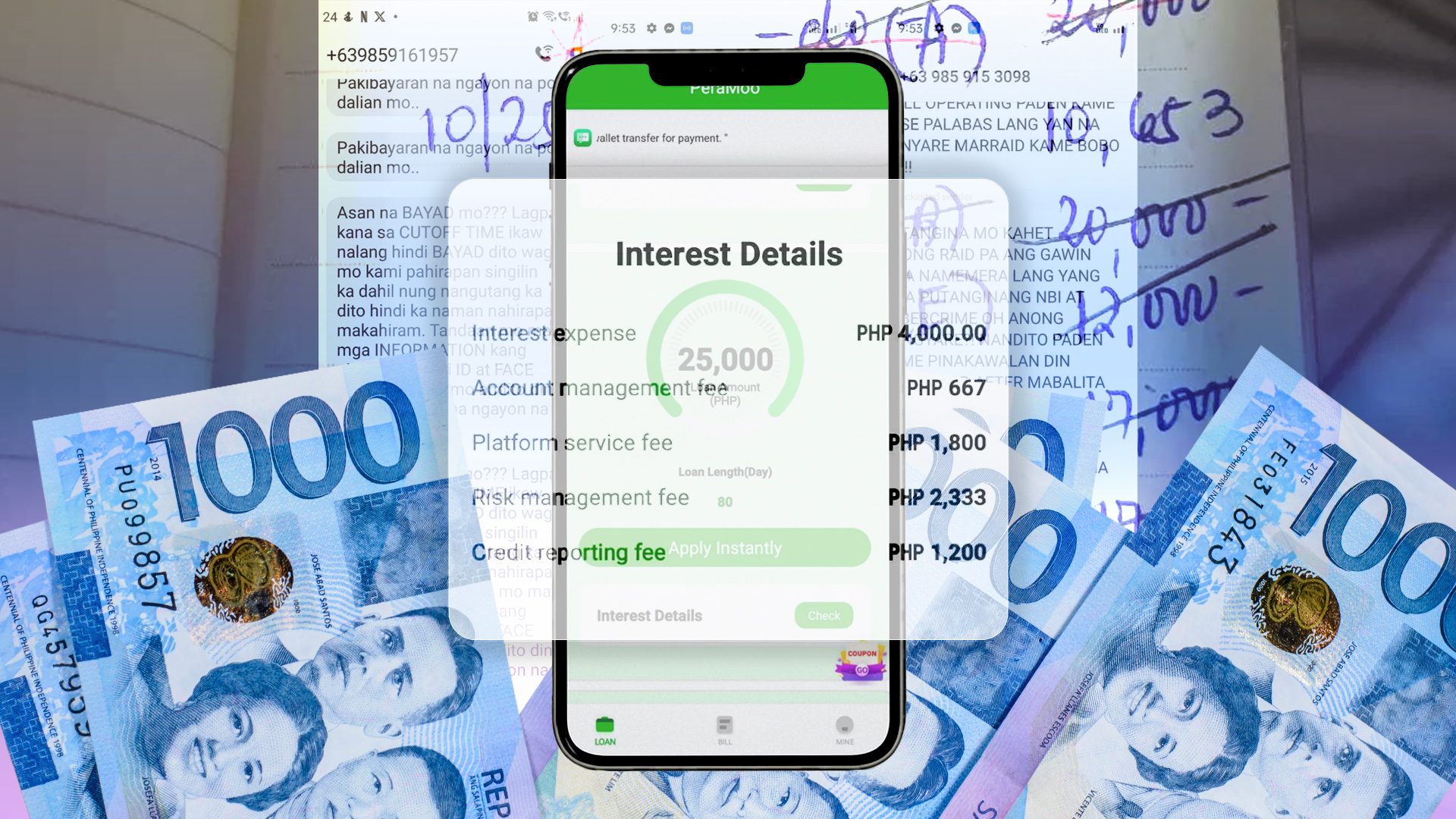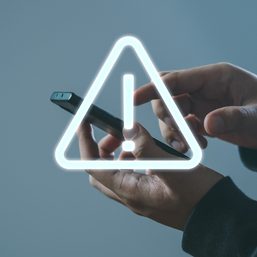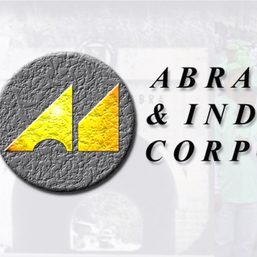SUMMARY
This is AI generated summarization, which may have errors. For context, always refer to the full article.

PAMPANGA, Philippines – It was in the middle of 2022 when Jean, an entrepreneur, tried an online lending application (OLA) to cover her issued checks. During that time, she struggled to fund them, as her business was still reeling from the aftermath of the COVID-19 pandemic.
Jean heard about lending app through a friend. Online advertisements have also started to appear in her social media and text messages since.
But what seemed to be a credit line turned into a financial nightmare. In just a year, Jean was P2 million deep in debt due to high interest rates and fees and short payment terms. She paid her loan by borrowing from other lending apps.
Jean is paying P98,000 to P200,000 worth of loans every week from 13 OLAs: Lendease, Pesohere, PeraMoo, Loanmoto, Surity Cash, Fast Cash, Cash Bee, Perafast, Pera4U, Peralending, Upesso, HelloPeso, and Peso Buffet.
Jean was trapped in a vicious reloan cycle.
“Due date na then wala ka pang pambayad. Kuha ka na naman ng ibang OLA with big interest and short term payment. It is really a trap.” (It’s due date but you have no funds to pay it off. So you’ll get another OLA with big interest and short term payment.)

“I got pressured. I am not used to having debts,” Jean said. “I lost a lot during the pandemic and I had to pay everything even if the money wasn’t moving nor I wasn’t earning. I have to save my checks from bouncing. In my case, I could pay off my loan if I’m given a reasonable time,” said Jean.
Hidden costs, false advertising
There are a total of 140 registered online lending platforms, according to the Securities and Exchange Commission (SEC).
The National Privacy Commission, however, has summoned 67 unregistered OLA operators that were subject of data privacy complaints but whose identities and business addresses elude detection.
Those who need instant cash are easily tricked into the “120-day” loan term payment. Debt collectors have bombarded her with text messages and calls as early as the 7th day.
The disbursed amounts are also far from what is advertised.
For instance, PeraMoo offers a loan of P25,000. But of that amount, P10,000 is charged to interest and other fees. The total disbursed or released amount is only P15,000. This means that Jean is paying a whopping 40% in interest and charges.
Interest and other fees include P4,000 interest expense, P2,333 risk management fee, P1,800 platform service fee, P1,200 credit reporting fee, and P667 account management fee.

Regulators’ actions
SEC has released a memorandum circular on the ceiling of interest rates and other fees charged by lending companies, which are based on the guidelines of Bangko Sentral ng Pilipinas.
BSP fixed the maximum interest rate at 6% and effective interest rate at 15% per month for covered loans which are unsecured, as well as general purpose loans that do not exceed P10,000 and with a loan tenor of up to four months.
According to the SEC, there are seven companies with more than 25 platforms and more than 100 individuals that are subject to criminal charges.
“With the enactment of the Financial Products and Services Consumer Protection Act in 2022, SEC was able to go beyond administrative actions and file criminal charges not just against the owners, directors or officers of the company, but also against the employees or agents who make harassing calls or send abusive text messages. These cases are currently pending before the Department of Justice,” Kenneth Quimio, assistant director of the SEC’s Financial and Lending Company Division, told Rappler on October 31.
Victims form support group
There were so many victims of online loan sharks, they created a support group.
Kikay Bautista, a family breadwinner and call center agent, was also deep in debt from online loan sharks. She started borrowing from OLAs during the peak of COVID-19 pandemic in 2021.
Kikay created United OLA Victims Movement after experiencing harassment, which included social media posts with her face, calling her a drug pusher, an iPhone thief, and even someone with acquired immunodeficiency syndrome (AIDS).

United OLA Victims Movement has around 49,000 members and is registered with the SEC.
To stop lending companies from abusive debt collection tactics, Quimio told Rappler that they are now looking at requiring lending apps to register with the Credit Information Corporation to avoid the unwarranted use of a borrower’s contacts.
“This way, lending companies and online lending platform operators would be assessing clients based on their credit information, and accordingly evaluate loan applications based on suitability and affordability, and not their contacts. In turn, we prohibit accessing a client’s contacts or getting the consent to send messages to a client’s contacts.”
SEC said lending companies are also required to submit all numbers they use to collect from clients including third party service providers and agents. Lending companies must also set up an internal Complaints Handling Mechanism as an initial response to complaints and concerns which will be reported to SEC.
Despite the lack of law on online lending platforms, Quimio said SEC acts through other laws like the Revised Corporation Code, Financing Companies Act and Lending Companies Regulation Act.
“Despite the lack of a law that expressly touches on these online lending platforms, the SEC optimized its powers through the enactment of regulations for the registration of online lending platforms and prohibition of abusive collection practices. This led to the revocation of registration of more than 2,000 companies, as well as their licenses to operate, and imposition of administrative penalties.”
SEC issued a memorandum circular preventing unfair debt collection practices in August.
Quimio stressed that companies that have been subject to raids can still collect debt.
“Tungkol sa kanilang mga pautang, maaari pa rin silang maningil dahil ang mga utang ay nangyari bago mag-raid at ang mga ito ay base sa kontrata o contract of loan. Hindi mabubura ang mga utang dahil na-raid ang isang OLA.”
(With regards to the loan balance, they can still collect debts as the loan was made before the raid and they are based on a contract of loan. The debts will not be erased because of an OLA raid.) – Rappler.com
Add a comment
How does this make you feel?




![[Finterest] Financial and travel scams to watch out for this Holy Week 2024](https://www.rappler.com/tachyon/2024/01/priest-scammed-january-27-2024.jpg?resize=257%2C257&crop=395px%2C0px%2C1080px%2C1080px)





There are no comments yet. Add your comment to start the conversation.